No to weakening wolves’ protection status
No to weakening wolves’ protection status
26.03.2024
France
No to weakening wolves’ protection status
Wildlife
Although the new ‘Wolf Plan’ came into effect a few weeks ago, facilitating slaughter conditions and revealing that the government’s wishes totally oppose these animals, wolves are getting no respite and are now threatened following announcements by the European Commission. The latter wishes to weaken wolves’ protection levels, taking the species’ status from ‘strictly protected’ to simply ‘protected’, a position that France supports through the Minister of Agriculture. A downgrade that we fiercely oppose. We will continue to fight for them for as long as they are not able to live in peace.
According to TF1, the Ministry of Agriculture, which does not care about animal welfare and works hand in hand with agricultural lobbies, is on the verge of announcing France’s support for this revision project and consequently the weakening of the protection status for wolves.
Those who have already been exterminated non-stop throughout the whole year, even during the reproduction and cub feeding periods, could be hunted down and killed even more easily if this proposition is accepted. If France encourages this initiative that goes against wolves, what will it be like for the other animals that disturb farmers and hunters such as lynx and bears? Will they be the next victims of an intensive agricultural system that wants to eliminate anything that disturbs it and continues to send more than a billion animals to the abattoir every year?
No, wolves do not attack herds for pleasure, contrary to what those who disparage them try to make people believe. These are wild animals who no longer have somewhere to live serenely, without interaction with humans, just like lions and tigers in Africa and Asia. Human activities take place in the mountains where a multitude of the animals bred are not protected, while hunters hunt down and slaughter stags, does, wild boars, deer, foxes, Galliformes, badgers, hares, marmots, and millions of other victims in the forests to occupy their free time, incapable of going out for some fresh air without killing living beings.
Along with us, demand an end to the persecution of wolves and demand that France opposes the weakening of their protection status.









